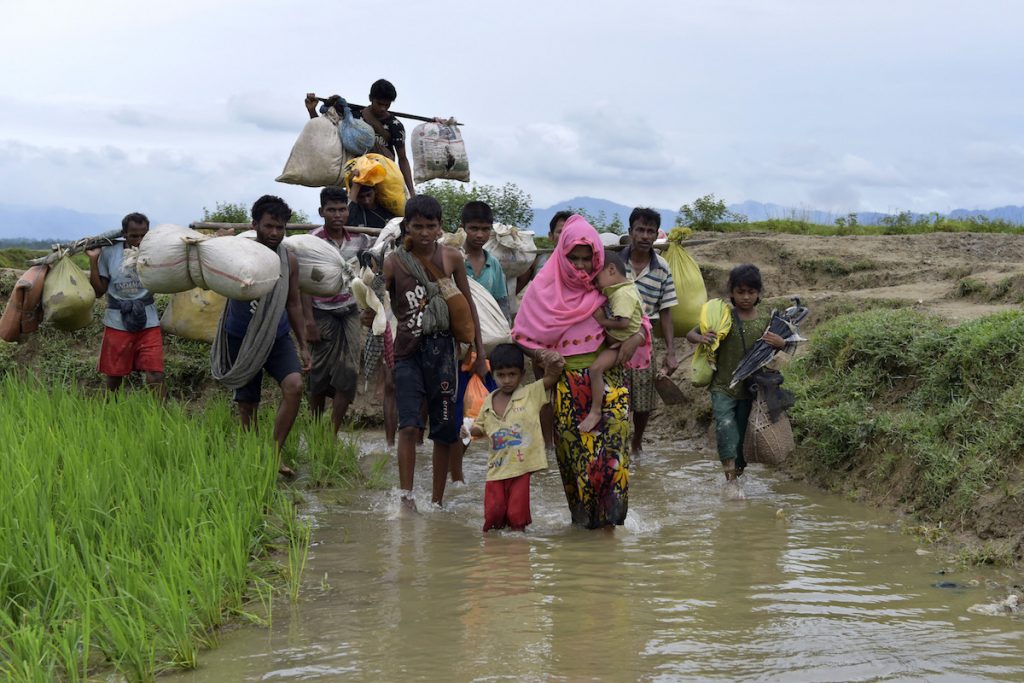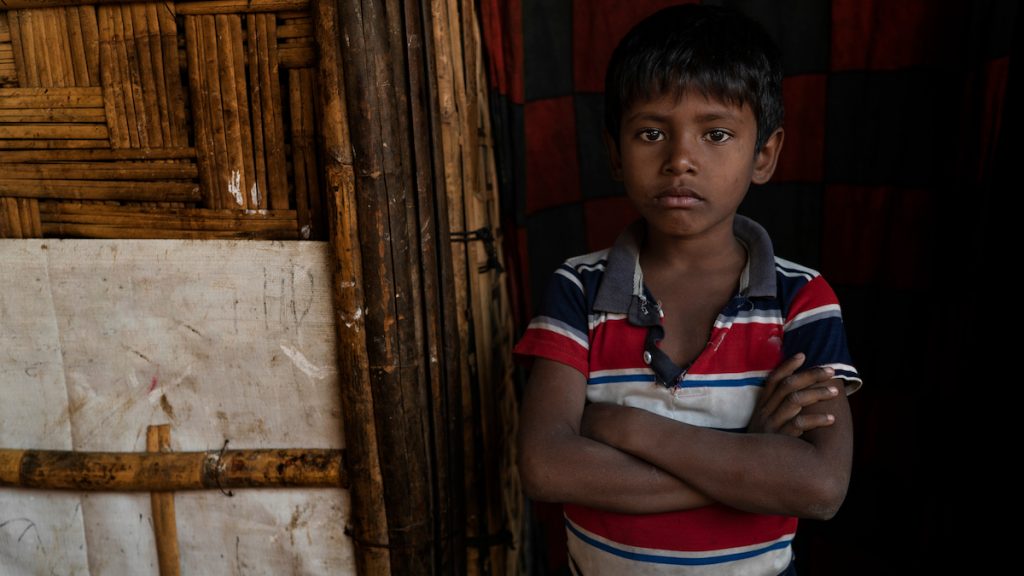Over the span of several weeks in August 2017, over 700,000 Rohingya were displaced from their homes in the northern Rakhine State of Myanmar in Southeast Asia. Most have since taken refuge across the border in Cox’s Bazar, Bangladesh.
The exodus was brought on by a bloody campaign led by the military junta, the Tatmadaw, whose actions against the Rohingya have been called, “a textbook example of ethnic cleansing” by the UN High Commissioner of Human Rights.
The Rohingya have experienced systemic murder, rape, starvation, torture, enslavement, and destitute living conditions on a massive scale. Further, unlike many other socio-political crises of this magnitude, what they lack is almost any significant international support in the short-term alleviation of their living conditions and the long-term goal of dignified repatriation.
According to the UN, which in January of this year proposed a Joint Response Plan requesting $876.7 million in life-saving assistance to over 850,000 Rohingya, only 17 percent of that request has been fulfilled. Furthermore, The Joint Response Plans from 2017 to 2019 were underfunded on average by $205.8 million per year. The UN also maintains that conditions in Myanmar are not yet safe enough for the Rohingya to return.
If we agree that the Rohingya have undergone, and are currently undergoing, immense suffering that we are capable of alleviating, then we have a moral obligation to extend our support.
For most of the readers of this article, the Rohingya are thousands of miles away. In fact, I think it’s accurate to say that the vast majority, at very least, live in a different country, even hemisphere, than the Rohingya. Between you, the reader, and the 1.3 million Rohingya in need of assistance, there is probably one tectonic plate and one sizable body of water.
Because of this distance, most of us will never witness their suffering firsthand, or even meet a Rohingya person in real life. Their lives and experiences might feel vague to us, or simply beyond our capacity for understanding.
Who among us has visited such a refugee camp, let alone lived in one? We may be able to imagine what it’s like to experience what the Rohingya have experienced; especially given the excellent documentary footage that exists.
But at the end of the day, most of us only know the Rohingya as two-dimensional figures on a screen or words in an article. For this reason, the lives of these people are reduced to statistics and headlines, beyond the reach of any tangible empathy. The Rohingya are at risk of becoming theoretical; their suffering, abstracted from our lives. Further, and perhaps even more alienating, whether we do or do not act, most of us will never see the results.

However, this shouldn’t matter. In his essay, Famine, Affluence, and Morality, the philosopher Peter Singer claims that “if it is in our power to prevent something very bad from happening, without thereby sacrificing anything morally significant, we ought, morally, to do it.”
This allows no leeway for emotional or physical distance since it makes no moral difference if the person in need of help is a friend living in your home or a stranger on the other side of the world. The fact is that there is the moral obligation to “prevent what is bad and to promote what is good.” And, Singer continues, if we all fulfilled that obligation, no one would go without support.
But there is a lack of support.
So, it follows that if an individual were to give more than their fair share, that individual would alleviate more suffering, as there would be a smaller aid deficit. By fair share, we simply mean what is within our moral obligation. This reasoning leads Singer to claim that it is the moral obligation of an individual to give maximally, independent of other people’s contributions, which leads to the question: What does it mean to give maximally?
Singer takes it to the logical extreme: He claims that if we have the power to alleviate someone’s suffering, then we must do everything we can to do so, up to the point of putting ourselves in a position of comparable suffering. This is all independent of the actions of others.
In other words, we must only stop giving aid when we’ve reached the point right before our circumstances are that of a Rohingya refugee. However, this is not the only account of our moral obligations toward the needy.
In his book Cosmopolitanism: Ethics in a World of Strangers, the ethicist Kwame Anthony Appiah offers a more palatable alternative to Singer’s extreme conclusion. For Appiah, Singer’s reasoning places a disproportionate amount of value on the act of surviving and not on the quality of life lived; it doesn’t take into account the reasons for which we live.
If we were to deny ourselves pleasures in life (such as the arts) on the grounds that they are a waste of resources, then in what kind of world would we live? This certainly doesn’t mean we abandon the prospect of supporting the Rohingya in order to pursue pleasure maximally. But it does require a redefining of what it means to give maximally.
It doesn’t stand to reason that relinquishing all personal wealth via checks to UNICEF is always the most effective method of supporting an international crisis (nor is it the most persuasive call to action). For the Rohingya, this is especially the case where the ultimate goal is their repatriation.
Only when the Rohingya are recognized as having as much a right to live in Myanmar as any other ethnic group, will they find any substantial increases in their quality of life. And only the collective will of government institutions have the power to realize this goal.

In a recent interview regarding the Rohingya crisis, Appiah frankly points out that though the government of Bangladesh alone does not have the power to force Myanmar to repatriate the Rohingya, the rest of the world certainly does. In his own words, “no country can survive the concerted opposition of the entire international community.”
Instead of undergoing intense personal sacrifice, we should orient our efforts towards petitioning our own governments, the institutions which have the power to enact real change. The base level of support we all should be obligated to fulfill is the rigorous lobbying of representatives. The cost to the individual is minimal, and the effect is maximal.
What are a few hours of your time compared to the potential betterment of 1.3 million lives?
Those who have the capacity to donate can make an immediate and positive impact on the Rohingya, who need both long-term and short-term support. Financial support should not be shrugged off in favor of bigger, systemic solutions; it should be considered in tandem with those solutions.
Furthermore, individuals can take measures such as speaking with or writing to their elected representatives to take certain concrete actions. For example, demanding UN Security Council enforcement of the judgment reached by the International Court of Justice this January — that Myanmar must take immediate measures to prevent genocide against the Rohingya community, protect all evidence relating to allegations in this case, submit compliance reports within a certain time period as long as the case is ongoing.
To give “maximally” should be to contribute your fair share. However, not everyone’s fair share is equal. There are many people whose financial position confers on them a greater moral responsibility.
For some, their fair share might not exceed lobbying congress; for others, it might encompass substantial donations to relief programs. If the amount one ought to contribute becomes apparent; it’s a matter of intuition and personal awareness. It is not necessary to forsake our quality of life in order to fulfill our moral obligation to the Rohingya; however, it is necessary to do our fair share, and for most of us, that encompasses more than what we are doing now.
Tarikul Islam is the President of Rise for Rohingya, an organization committed to positively impacting the Rohingya Refugee Community. Kedar Berntson is a documentarian and journalist for Rise for Rohingya. Yoann Huang has a BA in philosophy from NYU and currently writes for Rise for Rohingya.
The views expressed in this article are the opinions of the authors and do not necessarily reflect the editorial stance of LiCAS.news.






